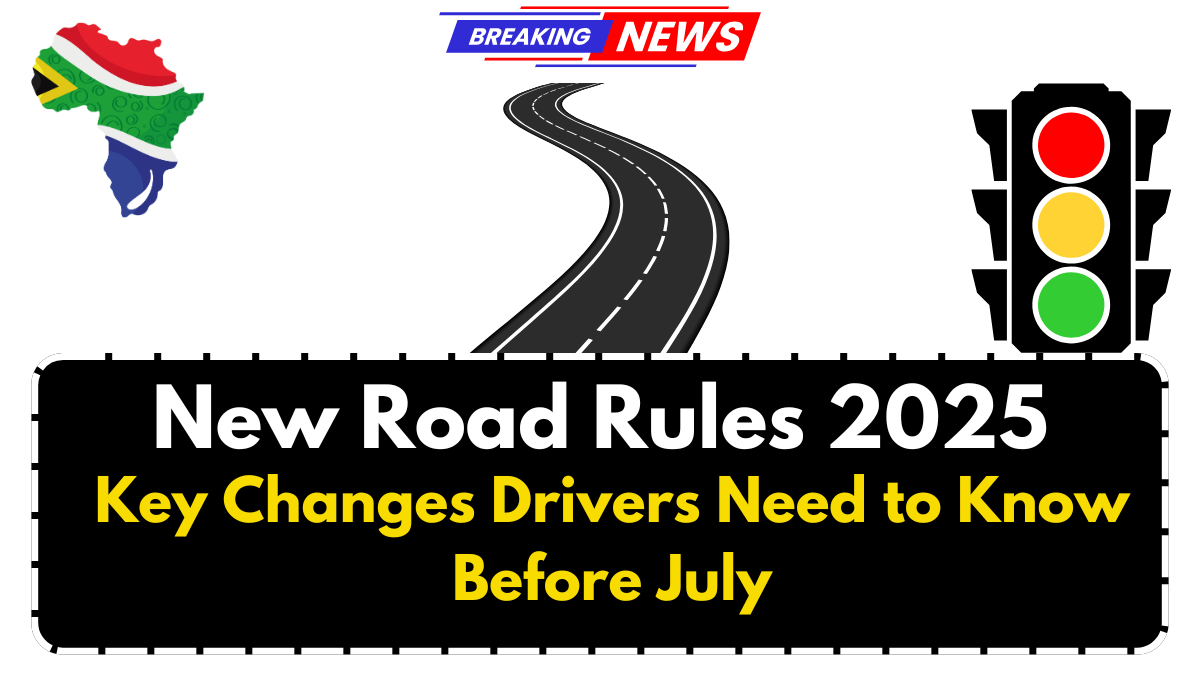South Africa is introducing a comprehensive update to its road traffic regulations, effective from July 1, 2025. This marks one of the most significant legal overhauls for motorists in over a decade. The changes aim to improve road safety, reduce fatalities, and streamline traffic enforcement. All drivers, both new and experienced, need to familiarize themselves with the updates to avoid penalties and ensure compliance.
Transport Minister Sindisiwe Chikunga confirmed in early May 2025 that the changes will affect urban, suburban, and national roadways. These updates include stricter licensing rules, revised speed limits, expanded zero-tolerance alcohol policies, and the launch of a new digital traffic monitoring system. These reforms were designed following a year-long consultation with law enforcement bodies, road safety NGOs, and the general public.

Key Road Rule Changes Effective July 1, 2025
| Category | Old Rule | New Rule (From July 2025) |
|---|---|---|
| Alcohol Limit | 0.05% BAC for drivers | 0.00% BAC for all drivers |
| Speed Limits | Variable by road type | Standardized limits with reduced margins |
| License Renewal | Every 5 years | Every 3 years with vision test |
| Traffic Monitoring | Manual patrols | Nationwide AI-based camera system |
| Learner Permit Age | 17 | 18 with mandatory safety training |
Zero-Tolerance Alcohol Policy Takes Center Stage
One of the most critical changes is the implementation of a strict zero-tolerance policy on alcohol. Previously, private drivers could legally operate a vehicle with a blood alcohol concentration (BAC) of up to 0.05%. Starting July 1, 2025, that limit is reduced to 0.00% for all drivers, including those using e-hailing services.
This reform aligns South Africa with global standards set by countries such as the Czech Republic and Slovakia, where any trace of alcohol in a driver’s system is grounds for prosecution. Authorities are also equipping patrol units with advanced breathalyzer devices capable of detecting alcohol at much lower thresholds. First-time offenders will face immediate license suspension and a mandatory rehabilitation course.
AI Cameras and E-Traffic Enforcement Roll Out Nationwide
A major step forward in traffic management is the introduction of AI-powered surveillance systems. Thousands of smart cameras are being installed on major roads and intersections across all nine provinces. These systems are designed to detect offenses such as speeding, illegal turns, and distracted driving in real-time.
Unlike traditional enforcement that relies heavily on visible patrols, the AI-driven infrastructure will function 24/7 and feed directly into municipal violation databases. Drivers will receive notifications via SMS and the Road Traffic Infringement Agency (RTIA) app, enabling quicker response and payment. The RTIA confirmed in a May 2025 statement that this technology is already operational in Johannesburg and Cape Town, with full national coverage expected by August.
License Renewals and Learner Age Adjustments
Another notable change is the adjustment to license renewal intervals. Previously, motorists were required to renew every five years. Starting in July, that period shortens to three years, and applicants must pass a basic vision screening. This measure is aimed at reducing accident risks related to undiagnosed visual impairments.
Additionally, the legal age for obtaining a learner’s license will increase from 17 to 18. New applicants will need to complete a certified road safety course before qualifying. The Department of Transport argues this approach better equips new drivers for real-world conditions, especially given the increasing complexity of road networks and vehicle technologies.
Speed Limits and National Standardization
Speed limits are also seeing significant revisions. Rather than allowing municipalities to set widely varying thresholds, the Department of Transport will now enforce nationally standardized speed zones. Residential areas will be capped at 40 km/h, urban roads at 60 km/h, and highways at 100 km/h unless otherwise marked.
Enforcement margins have also been narrowed. Where drivers previously had a buffer of 10 km/h above the posted limit, that margin will be reduced to just 5 km/h. Authorities argue that more consistent speed control reduces accidents and promotes smoother traffic flow.
Conclusion: Stay Compliant, Stay Safe
With the July 2025 deadline fast approaching, drivers must stay informed and adjust their habits accordingly. The new rules are not only about compliance but about creating a safer, more efficient road environment for everyone. Authorities encourage motorists to utilize digital tools like the RTIA app and official government updates to track their records and receive notifications. These changes mark a significant move toward modernization and road safety accountability in South Africa.
FAQ
What is the new legal blood alcohol limit for drivers?
From July 1, 2025, South Africa will enforce a zero-tolerance policy, setting the legal blood alcohol limit at 0.00% for all drivers.
Are there any changes to the driving age in South Africa?
Yes, the minimum age to apply for a learner’s permit will be raised to 18. Applicants must also complete a mandatory safety training course.
How often will I need to renew my driver’s license now?
Driver’s licenses must now be renewed every three years, and the process includes a mandatory vision screening.
Will these new AI cameras issue fines automatically?
Yes, the AI-enabled cameras can detect offenses and issue fines automatically through the RTIA’s digital platform.
How will I be notified of any traffic violations?
Drivers will receive real-time notifications via SMS and through the official RTIA mobile app.
For More Information Click Here
Akesh is a furniture expert with years of experience in design and craftsmanship. Specializing in sustainable materials, he shares his expertise to help people create stylish and functional living spaces.
